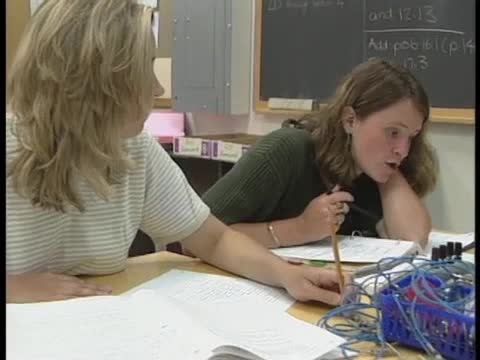Vietnam: A Television History; Vietnamizing the War (1968 - 1973); 108; Interview with Sidney N. (Sid) Towle, 1981

- Transcript
The emphasis on reasoning can be very frustrating to most people. But by the end of the summer most teachers have come to recognize that it's useful to them not only for their own learning but in helping them identify what difficulties their own students are going to have with this material and what kinds of questions they can use to help their students learn. I said to Marian student to student B and C are equally bright but dimmer than a b and c have to share the battery voltage Whereas I guess all of it seems strange. That. Spring it's raining a little bit better. Yeah that's right a whole thing with what we were talking about before about voltage and current US and the indication of rightness and they just needed to explain his reasoning more clearly on the relationship between voltage and current meters. OK. Three stone and three says brighter than B and B is brighter than the
current Celeste gets through to C and gets all the current so it is the brightest current doesn't get used. That's the biggest mistake there is the same as CS So there's a huge mistake there because the same for the batteries cycle brightness. You're just getting less current because there's two bulbs in series which has more resistance plus current. And also they'll have half the voltage because. The voltage split equally between the two because they're equal resistor current. And will have more voltage. Got all the voltage of that in there for all current and it will be the brightest. As a result of this kind of experience teachers become very comfortable with these ideas and we've found that they are able to analyze circuits complicated circuits that students with more sophisticated mathematics are often able to analyze.
Right so we all agree on. Yes yes it's all ready for checkout. When I do the larger group in my classroom you lose some of the interactions that you get with the smaller groups that we see here and sometimes students can definitely slip by that aren't really grasping it they can slip by in a larger group so you can miss them but with enough homework assignment you can usually see who is missing the point. So you need to modify how you assess whether they are the proper understanding. My students felt more confident in what they were doing they weren't just going blindly through and saying well is this. The answer they got. And maybe it's something they copied off their friend's paper. They could actually tell me a little bit more about how they got their answer. Here. It's very student center. We are the students. I love the way that that gives me ownership in my own learning. And I have a lot more passion about that than I would have. When he was just saying you
need to learn this and I want to take that back to my students. And I want them to have the same passion about learning that I do. To find out which students are raising.
- Episode Number
- 108
- Raw Footage
- Interview with Sidney N. (Sid) Towle, 1981
- Contributing Organization
- WGBH (Boston, Massachusetts)
- AAPB ID
- cpb-aacip/15-t72794153d
If you have more information about this item than what is given here, or if you have concerns about this record, we want to know! Contact us, indicating the AAPB ID (cpb-aacip/15-t72794153d).
- Description
- Episode Description
- Sidney Towle was a Captain in the U.S. Army during the Vietnam War. He describes his mission: to find and "neutralize" elements of the Viet Cong as part of the Phoenix Program. He explains his disenchantment with the program over its extreme methods and questionable efficacy. Mr. Towle outlines the major faults of the Phoenix Program, including the irony of Americans unable to pronounce Vietnamese names trying to figure out aliases. He finally details his release from the program after his complaints, and his subsequent reassignment.
- Date
- 1981-07-14
- Asset type
- Raw Footage
- Topics
- Global Affairs
- War and Conflict
- Subjects
- Vietnam War, 1961-1975--Campaigns--Cambodia; United States--History, Military--20th century; Intelligence officers; torture; questioning; Chieftains; Village communities; Vietnam War, 1961-1975--Personal narratives, American; Vietnam War, 1961-1975--Protest movements--United States; United States--History--1945-; United States--Armed Forces--Occupational specialties; Veterans--United States; Treaties; Vietnam (Republic)
- Rights
- Rights Note:Not to be released to Open Vault,Rights:,Rights Credit:,Rights Type:Web,Rights Coverage:,Rights Holder:
- Rights Note:It is the responsibility of a production to investigate and re-clear all rights before re-use in any project.,Rights:,Rights Credit:WGBH Educational Foundation,Rights Type:All,Rights Coverage:,Rights Holder:WGBH Educational Foundation
- Media type
- Moving Image
- Duration
- 00:03:49
- Credits
-
-
Publisher: WGBH Educational Foundation
Writer: Towle, Sidney N. (Sid)
- AAPB Contributor Holdings
-
WGBH
Identifier: 3155f4d7e9fb3aea14f42219207fd0722759653b (ArtesiaDAM UOI_ID)
Format: video/quicktime
Color: Color
Duration: 00:21:51:29
If you have a copy of this asset and would like us to add it to our catalog, please contact us.
- Citations
- Chicago: “Vietnam: A Television History; Vietnamizing the War (1968 - 1973); 108; Interview with Sidney N. (Sid) Towle, 1981,” 1981-07-14, WGBH, American Archive of Public Broadcasting (GBH and the Library of Congress), Boston, MA and Washington, DC, accessed June 30, 2025, http://americanarchive.org/catalog/cpb-aacip-15-t72794153d.
- MLA: “Vietnam: A Television History; Vietnamizing the War (1968 - 1973); 108; Interview with Sidney N. (Sid) Towle, 1981.” 1981-07-14. WGBH, American Archive of Public Broadcasting (GBH and the Library of Congress), Boston, MA and Washington, DC. Web. June 30, 2025. <http://americanarchive.org/catalog/cpb-aacip-15-t72794153d>.
- APA: Vietnam: A Television History; Vietnamizing the War (1968 - 1973); 108; Interview with Sidney N. (Sid) Towle, 1981. Boston, MA: WGBH, American Archive of Public Broadcasting (GBH and the Library of Congress), Boston, MA and Washington, DC. Retrieved from http://americanarchive.org/catalog/cpb-aacip-15-t72794153d